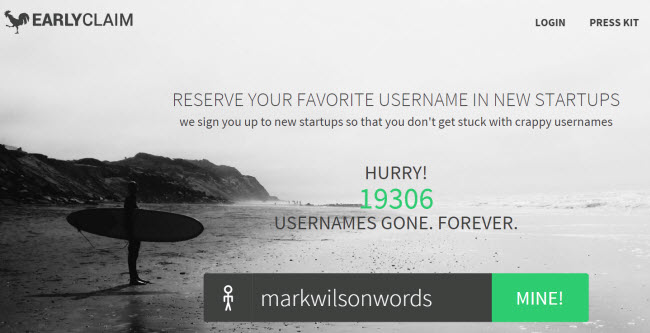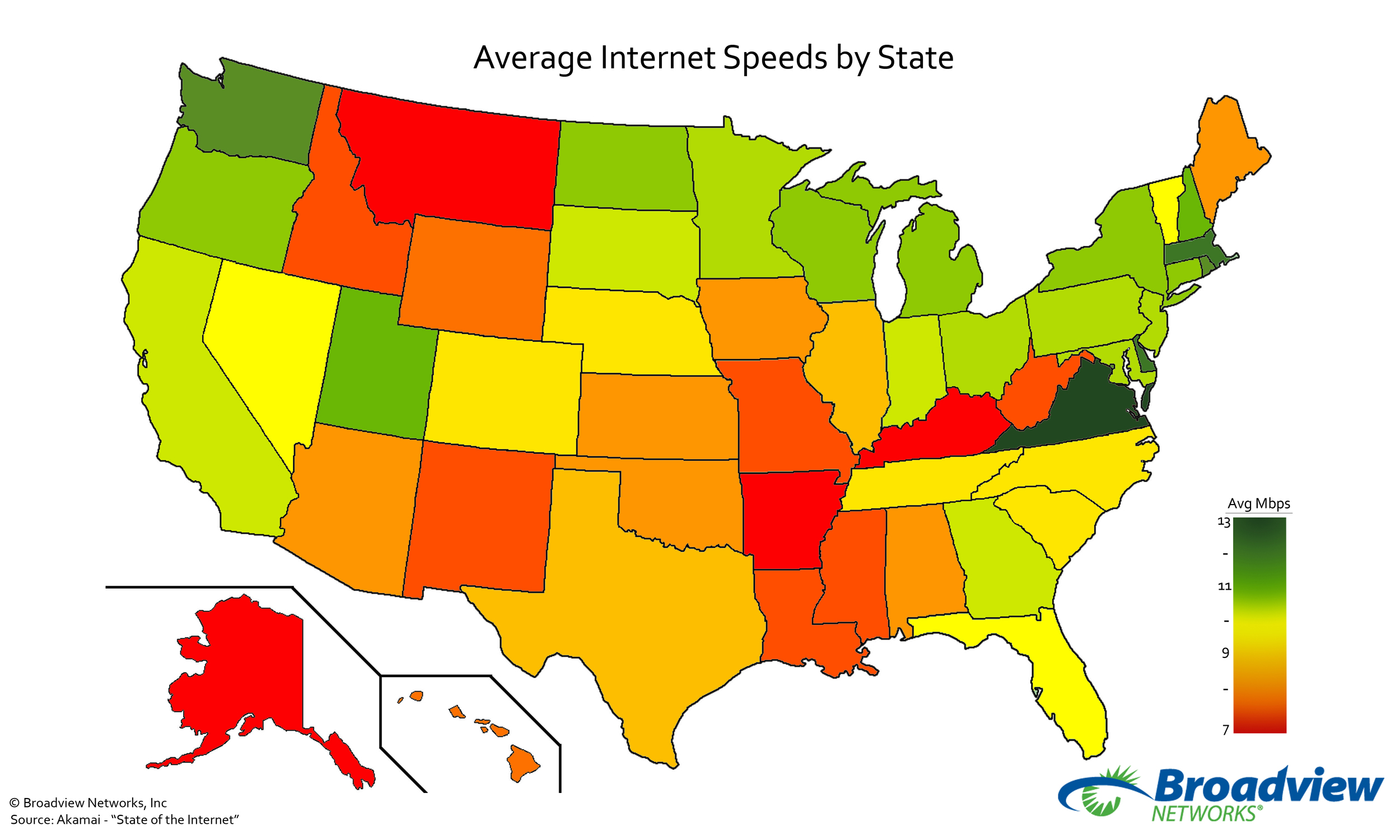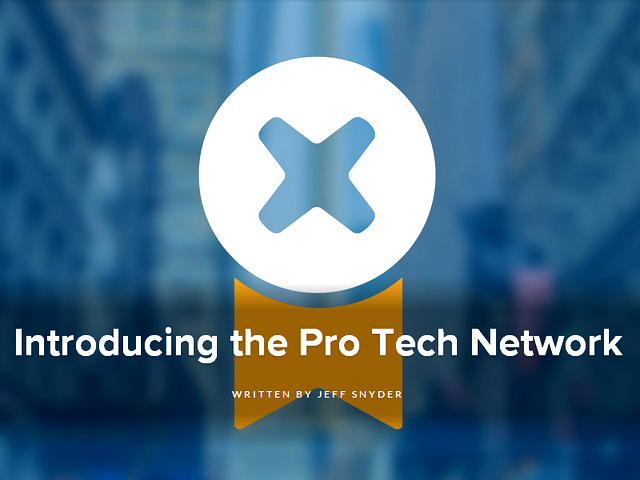
EarlyClaim reserves usernames so you don’t end up with a crappy handle
You never know when the next Twitter is going to crop up. When a new service like Pinterest, Vine, or Skype appears, if you're not quick off the mark there's a high chance you'll miss out on your preferred username. You want MarkWilsonWords? Sorry, that went ages ago… you'll have to settle for MarkWilsonWord09868. Getting stuck with a crappy username sucks, but it's very hard to monitor all of the new services that pop up so you can bag your ideal name as early as possible. This is something that EarlyClaim can help with.
It's a free service that seeks out new startups and reserves a username on your behalf -- you just say what handle you'd like, and EarlyClaim does the hard work for you. For businesses, it is important to have a brand identity that is the same across different social networks (who is going to take notice of Coca Cola 1897 on Facebook?) but it's also something that is valuable to individuals. How many times have you signed up for a site only to find that you're unable to secure the username of your choice and had to opt for something far inferior? Every time you use that service there is a constant reminder that you weren't fast enough at signing up.

Constantly turned on -- the bleak reality of being permanently connected
We expect, and are expected, to be contactable at any given moment -- and indeed we often expect the same of others. Send a text, and you expect a response. Pen an email, and you expect to receive one in return, and fast. Hit up someone on Google chat and an all-but-instant reply is all but expected. Maybe this doesn’t sound like you, but I can guarantee that you fit on the spectrum, and also that the people you are in contact with make the same demands of you. When did this change? It used to be that you'd call a landline number and if you didn’t get a reply you might just try again a few hours later. The fact that we now carry mobiles with us virtually 24/7 means that it is weird if someone doesn't answer the call.
They can’t be busy! Try again! Still no reply? Send a text. And an email. And an IM. If it was limited to office hours, it might be understandable -- and bearable -- to some extent, but there has been a massive slip in end-times. It is acceptable to send emails to someone at any time of day. You may have woken up at 3 in the morning and thought of something relating to work, or even just something that made you laugh, and felt the need to share it immediately. The recipient, in all likelihood, will be alerted to this email on a smartphone or tablet if they don’t happen to be sitting at their computer. At 3 in the morning, it might not wake them up, but at, say, 8pm how likely is it that the email will be ignored? The recipient's working day just got extended by several hours.

Silver surfing lessons can help fight dementia
Encouraging the elderly to use the internet can not only help them keep in touch with friends and family and take advantage of the best deals, it can also reduce the likelihood of dementia.
The results of an eight-year study of 6,500 50-90 year-olds reveal that those who regularly go online experience less mental decline compared to those who don't use the internet. The study shows a significant improvement in delayed recall over time for those who were frequent online users, highlighting the role played by the internet in preventing the degeneration of mental abilities in the elderly.

How happiness is related to internet connectivity
Internet access doesn’t make people happy, but it is a sign of the probability of happiness.
A 2013 poll by the Gallup-Healthways Well-Being Index measured people’s happiness state by state across America. We cross-referenced the Happiness Index from the Gallup Poll with US census numbers on the percentage of a states’ residents who access the Internet from their homes and found an interesting correlation. Nearly 40 percent of the happiness index score for any given state can be estimated by knowing the Internet access percentage of that state.

Average US internet speeds -- how does your state compare?
While my colleague Mark Wilson endures glacially slow internet, I’m lucky enough to be on a super-fast 100Mbps connection (but even that’s a bit slow for me -- I’ll be upgrading to 152 Mbps early next year).
The average connection speeds for most internet users is a lot slower, but getting better. Broadview Networks took a look at the average internet speeds in America, and listed the results by state, showing average speed in Q1, and comparing the results quarter-on-quarter and year-on-year.

Microsoft and iFixit launch a new gadget repair site
Microsoft and gadget repair website iFixit have announced the launch of Pro Tech Network, a service designed to teach more people how to fix gadgets.
The partnership should help give people the skills they need to fix devices, set up businesses and recycle the valuable materials within electronic products.

Bring your own ID to simplify access to systems
One of the problems with relying on technology for so many things is that you end up with a whole raft of user IDs, for work, banking, shopping, social media and more.
A new study by the Ponemon Institute and IT management specialist CA Technologies looks at the idea of simplifying things through the use of Bring Your Own Identity (BYOID) initiatives, where social networking or digital IDs are used for application login.

Addicted to gadgets and constantly tired? That's the modern world!
According to new research, Britons are now spending more time using technology devices than sleeping.
Ofcom has released a fresh report detailing our daily habits, and the results are relatively scary.

Edward Snowden can stay in Russia for at least three more years
The enfant terrible of the tech world, and the thorn in the side of the NSA, Edward Snowden has been granted permission to stay in Russia for a further three years. The former NSA analyst turned whistle-blower sought exile in the country a year ago and on August 1st he was granted an extension. The three-year residency permit was approved a week ago, but has only just been made public by Snowden's lawyer. Anatoly Kucherena explained that Snowden himself would hold a press conference as soon as possible, reported Russia Today.
The US has tried to force Russia to hand over Snowden so he can face charges in his home country, but for the time being, he will be able to stay where he is. If he feels inclined, the permits allows for him to travel abroad for up to three months, and he is free to travel wherever he wants within Russia. Although he has not expressed an interest in doing so, Snowden would be eligible to apply for permanent residence in Russia in five years' time.

Technology knowledge -- it's all downhill after you're 14
A new study by the UK's communications regulator Ofcom finds that the "millennium generation" of 14-15 year olds are the most technology aware group but as we get older digital knowledge begins to decline.
The study of 2,000 adults and 800 children measured confidence and knowledge of communications technology to calculate a Digital Quotient (DQ) with the average UK adult scoring 100.

The age of supply, not demand
I had lunch last week with my old friend Aurel Kleinerman, an MD who also runs a Silicon Valley software company called MITEM, which specializes in combining data from disparate systems and networks onto a single desktop.
Had the Obama Administration known about MITEM, linking all those Obamacare health insurance exchanges would have been trivial. Given MITEM’s 500+ corporate and government customers, you’d think the company would have come to the attention of the White House, but no.

Geo-location marketing helps brands engage with customers
A recent report by Juniper on mobile ad spending estimated that it’s set to reach $40 billion a year by 2018. It's easy to understand why since the data it's possible to collect from a mobile device is valuable to marketers.
In a move to unlock this information media analytics company Visible Technologies has announced a new set of geo-location capabilities for its Visible Intelligence platform that give marketers the power to pinpoint specific locations of consumer social media posts anywhere in the world.

Google email scanning technology catches pedophile sharing abuse photos
The scanning of personal emails is almost universally regarded as a terrible thing. Just like the activities of the NSA, when email providers start rifling through private information, it has a tendency to upset people. The justification for governmental mass surveillance has always been that it helps to combat crime -- and of course we never have to wait for long before the words "terrorists", "extremists", and "attack" are used. Google has just demonstrated how email scanning can be used to catch criminals. In this case, Google's image recognition software was used to identify images of child abuse sent via email by a Texan man.
A 41 year old man was arrested after the system detected suspicious material. The police were alerted and requested the user's details from Google after child protection services were automatically notified of the findings. The convicted sex offender's account triggered an alert after automatic, pro-active scans detected illegal pictures and Google then reported it to the National Center for Missing and Exploited Children. Google is understandably tight-lipped about how its technology works, but as the Telegraph points out, we do already know a little about the methods used.

Which people make the best remote bosses?
It's reckoned that more than 60 percent of employers offer some form of remote working in order to increase employee satisfaction and retention rates.
But what type of boss makes for a harmonious telecommuting experience? Online forms specialist Formstack has put together an infographic evaluating the traits of different types of manager and how they lend themselves to working with remote teams.

XBMC is officially changing its name, meet Kodi
XBMC has gone through many iterations over the 12 years of its existence. The program, which now powers a number of home theater computers, began life as Xbox Media Player, then morphed into Xbox Media Center, before finally settling on the shorter abbreviation of XBMC.
But the platform has moved so far off from its original Xbox beginnings that it has announced it will get away from the old name as well.
